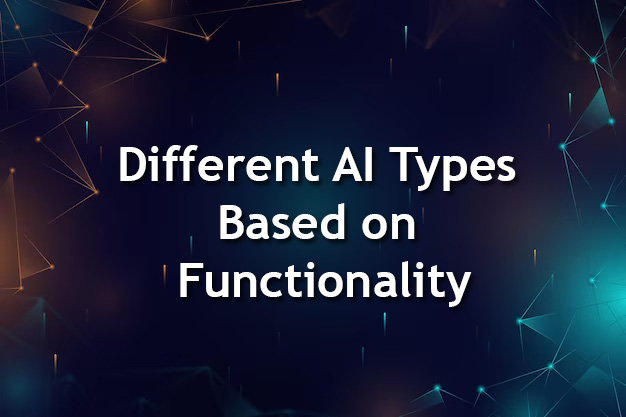11 Different AI Types Based on Functionality: Artificial Intelligence (AI) has evolved into a transformative force that permeates various aspects of our daily lives. As technology continues to advance, so does the sophistication of AI systems.

Image Source: FreePic.Com
Also See: Disadvantages of AI in Education
One key way to categorize AI is based on its functionality, dividing it into distinct types that serve specific purposes. In this article, we will delve into the diverse landscape of AI, examining different types based on their functionality and applications.
11 Different AI Types Based on Functionality
Narrow AI (Weak AI)
Narrow AI, also known as Weak AI, refers to systems designed for a specific task or a limited set of tasks. These systems excel in performing predefined functions but lack the ability to generalize beyond their designated scope. Common examples include virtual personal assistants like Siri or Alexa, which are adept at natural language processing and providing information within a specific domain.
General AI (Strong AI)
In contrast to Narrow AI, General AI, or Strong AI, is a theoretical form of artificial intelligence that possesses the ability to understand, learn, and apply knowledge across a broad spectrum of tasks, similar to human intelligence. General AI aims to replicate human cognitive abilities, including reasoning, problem-solving, and comprehension. Achieving true General AI remains a formidable challenge, and current AI technologies are primarily confined to Narrow AI applications.
Also See: Disadvantages of AI in Cybersecurity
Machine Learning (ML)
Machine Learning is a subset of AI that focuses on enabling systems to learn and improve from experience. Rather than being explicitly programmed for a task, ML algorithms use data to identify patterns, make predictions, and continuously enhance their performance. Supervised learning, unsupervised learning, and reinforcement learning are common approaches within machine learning, contributing to applications such as image recognition, natural language processing, and recommendation systems.
Deep Learning
Deep Learning is a specialized branch of machine learning that utilizes artificial neural networks to simulate the human brain’s structure and functioning. These deep neural networks consist of multiple layers, enabling the model to automatically extract hierarchical features from data. Deep learning has proven highly effective in image and speech recognition, language translation, and autonomous vehicles. Convolutional Neural Networks (CNNs) and Recurrent Neural Networks (RNNs) are popular architectures within deep learning.
Natural Language Processing (NLP)
Natural Language Processing focuses on enabling machines to understand, interpret, and generate human language. NLP incorporates elements of linguistics, computer science, and artificial intelligence to bridge the gap between human communication and machine comprehension. Applications of NLP range from sentiment analysis and language translation to chatbots and virtual assistants, enhancing human-computer interaction and communication.
Also See: Future of Artificial Intelligence in Marketing
Computer Vision
Computer Vision involves teaching machines to interpret and make decisions based on visual data. This field leverages image and video processing techniques, enabling machines to recognize patterns, objects, and even emotions within visual content. Applications of computer vision include facial recognition, object detection, autonomous vehicles, and medical image analysis.
Robotics
AI plays a crucial role in the field of robotics, contributing to the development of intelligent machines capable of perceiving their environment, making decisions, and executing actions. Robotic systems powered by AI algorithms are utilized in manufacturing, healthcare, agriculture, and exploration. These robots can adapt to changing circumstances and collaborate with humans in various scenarios.
Expert Systems
Expert Systems, also known as knowledge-based systems, are AI applications designed to replicate the decision-making abilities of a human expert in a specific domain. These systems use knowledge representation and inference mechanisms to solve complex problems. Expert systems find applications in areas such as medical diagnosis, finance, and troubleshooting technical issues.
Autonomous Systems
Autonomous systems integrate AI technologies to operate independently, making decisions and taking actions without continuous human intervention. Examples include autonomous vehicles, drones, and smart appliances. These systems use sensors, machine learning algorithms, and decision-making processes to navigate and perform tasks in diverse environments.
Reactive Machines
Reactive Machines are AI systems that operate based on predefined rules and responses. They don’t have the capability to learn or adapt from experience but excel in executing specific tasks within their programmed parameters. Chess-playing programs, for instance, operate as reactive machines, employing predefined strategies and rules to make moves.
Self-aware AI
The concept of self-aware AI involves machines having an understanding of their own existence, consciousness, and the ability to reflect on their state. As of now, true self-aware AI remains largely speculative and is a topic of philosophical discussion. The majority of existing AI systems lack self-awareness and operate within predetermined boundaries set by their developers.
Also See: How Conversational AI Works?
Conclusion:
Artificial Intelligence, in its myriad forms, continues to redefine the way we live, work, and interact with technology. The classification of AI based on functionality provides a structured framework to comprehend the diverse applications and capabilities of these intelligent systems.
As technology advances, the lines between different types of AI may blur, and new paradigms may emerge, bringing us closer to the realization of more sophisticated and adaptable artificial intelligence. The ongoing evolution of AI promises a future where intelligent machines contribute significantly to solving complex problems and enhancing the overall human experience.